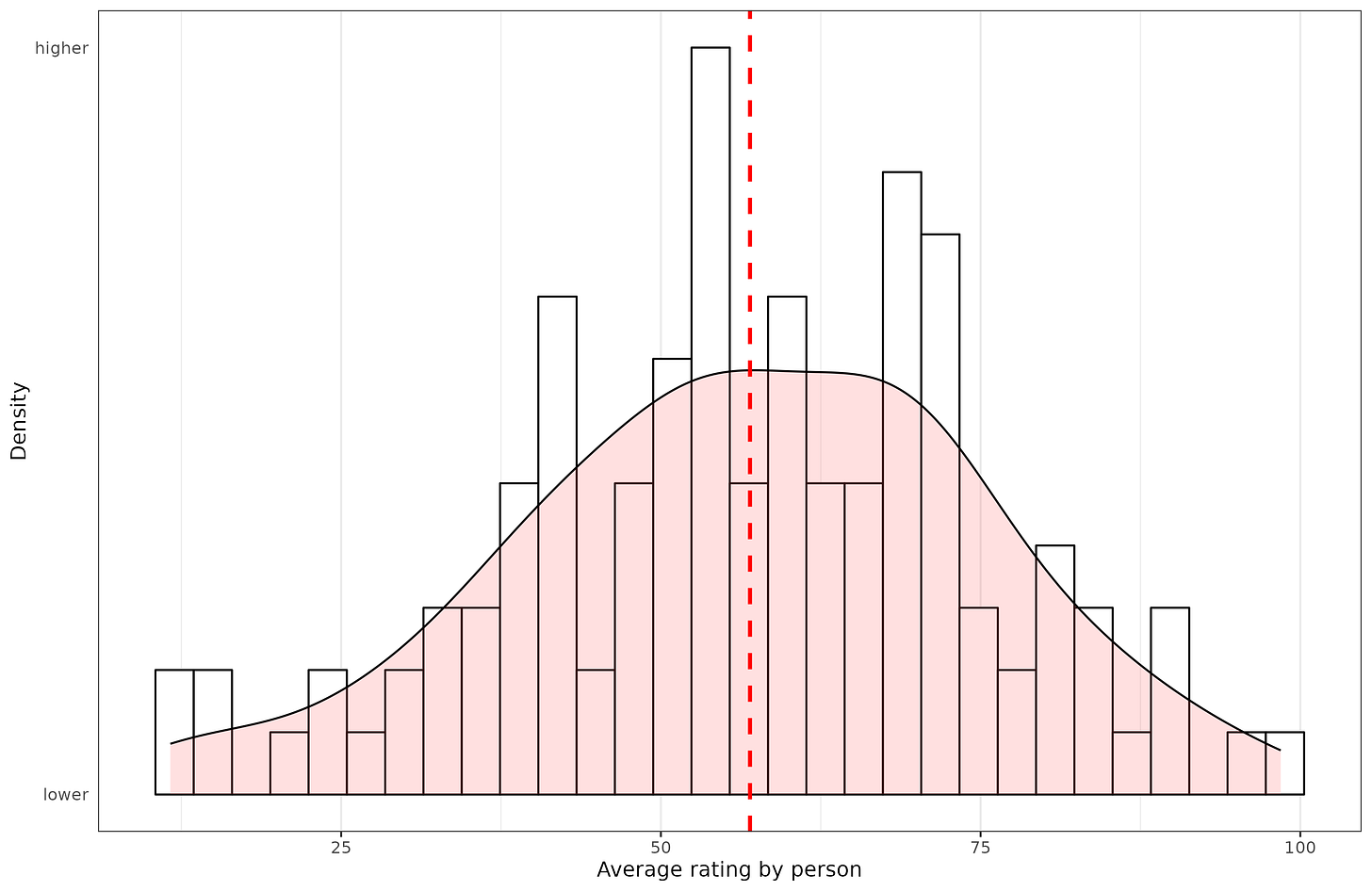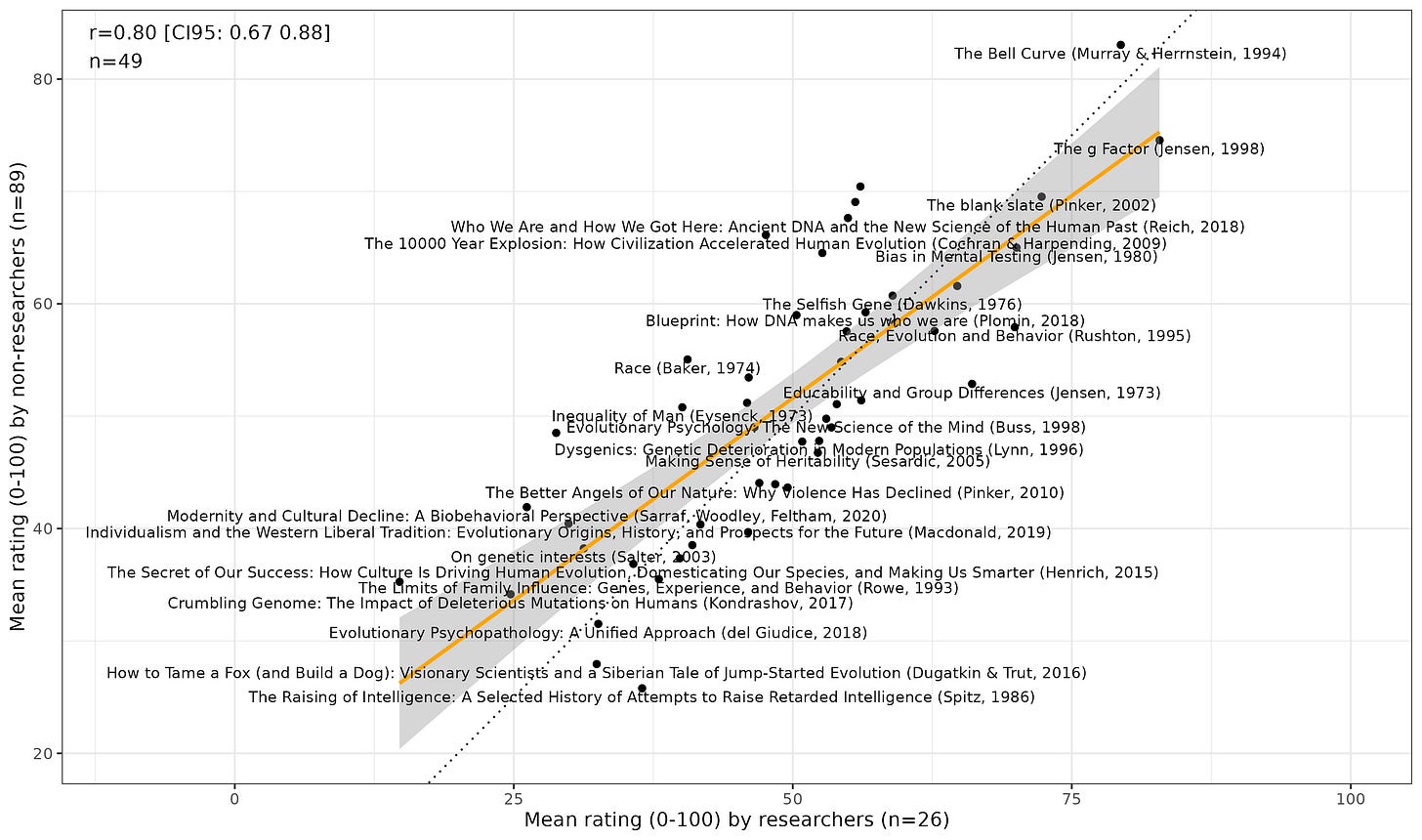What are the most important human biodiversity books?
The Bell Curve comes out on top
Yesterday I ran a survey on Twitter asking people to rate 49 human biodiversity books for importance. Human biodiversity here used in the broad sense of any study of biological human differences whether these are between individuals, sexes, ethnics, sexual orientations etc. Overall 136 people contributed ratings, and of these 115 were non-trolls. The main result is this plot:
The Bell Curve came out as the overall winner. I didn't give people any particular instructions on how to rank importance, so they used whatever criteria they decided. The specific question was ("Rate the books by importance. If you aren't familiar with them, you can just skip them. If you don't touch the slider, no value will be recorded for it"). The survey is here if you would like to add more ratings.
One problem with rankings like this is that some people just assign higher values overall to every book, and if they also had a preference for certain books, this would inflate those books rankings due to scale differences. The distribution of average raters per rater looks like this:
However, when I adjusted for this, I found the same results:
Ratings were adjusted by setting each rater's ratings to z scale, so the average book they rated would get 0. So in other words, what this tells us is that The Bell Curve was rated about 1 standard deviation higher on average than the other books each subject rated.
Another issue is that people assigned much higher ratings to books that more people had rated, thus suggesting it is more of a popularity contest:
Alternatively, people rationally choose to read what they perceived to be the more important books.
Looking at the differences in what researchers (n = 26) vs. laymen (n = 89) rated, there isn't that much difference:
The dotted line shows the slope of 1.00, i.e., the line we would expect from perfect agreement. Books in the bottom right triangle are those rated higher by researchers than non-researchers, and those above are the opposite. The Bell Curve is slightly higher rated by laymen (83 vs. 79), whereas Jensen's The g Factor enjoys higher ratings by researchers (83 vs. 75). This shouldn't be too surprising because the first is a mostly non-technical book written for the intelligent layman whereas Jensen's book is highly technical. But then again, there's a lot of pretty technical, difficult books that are in the other quadrant (e.g. Sarraf's Modernity and Cultural Decline).
I would like to add my mea culpa for forgetting several important books that the were posted in the comments. These were:
A Farewell to Alms (Greg Clark, 2007)
IQ and the wealth of nations (Richard Lynn, 2002)
Descent of Man (Charles Darwin, 1871)
The Origin of the Species (Charles Darwin, 1859)
Hereditary Genius (Francis Galton, 1869)
Inquiries Into Human Faculty and Its Development (Francis Galton, 1883)
The Ape that Understood The Universe, (Steve Stuart-Williams, 2018)
In fact, I had added some of these, but I had an error saving the survey and they were lost, and I forgot them in the second time around.
Finally, if you are curious about my ratings vs. the wisdom of the crowds:
As before, the values on the top left of the dotted line are those I rated higher than the average. Here my Jensen fanboyism shows up. Jensen's books had a huge influence on my thinking, but most people don't read them, as they are academic tomes (Bias in Mental Testing is 800 pages). But then again, I rated Dawkins' non-technical The Extended Phenotype very highly because it influenced my thinking about human social structures. Similarly, Bryan Caplan's The Case against Education is the only book of its kind.
Here's the table of ratings for those curious:








It seems that the intellectual elite doesn't like dutton, mcdonald and anti-modernism very much.
I am sure dutton can explain this with mutation loading:)
Is there continuing value in now outmoded scientific classics like Cavalli-Sforza's History and Geography of Human Genes, Coon's Living Races of Man, Darwin's Descent of Man, and Galton's Hereditary Genius?